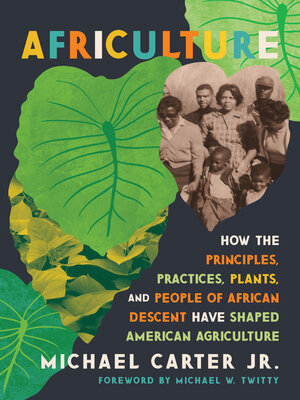Africulture
ebook ∣ How the Principles, Practices, Plants, and People of African Descent Have Shaped American Agriculture
By Michael Carter, Jr.

Sign up to save your library
With an OverDrive account, you can save your favorite libraries for at-a-glance information about availability. Find out more about OverDrive accounts.
Find this title in Libby, the library reading app by OverDrive.



Search for a digital library with this title
Title found at these libraries:
| Library Name | Distance |
|---|---|
| Loading... |
A bold, timely history by a leading Black farmer illuminating the massive contributions to US agriculture made by African expertise and innovation
At the heart of Africulture is an aspect of history that will surprise, challenge, and enrich: the fact that without African expertise and innovation, American agriculture—and America itself—would not exist.
This book is an eclectic brew of history, culture, African-centered perspectives, and African American farm realities; inspiring stories of innovators such as Henry Blair and Dr. George Washington Carver; and sobering facts such as the severe decline in Black farmers over the last century. Descriptions of tropical crops, from cotton to Nigerian spinach, that author Michael Carter, Jr. grows on his fifth-generation family farm in Virginia enliven the text, as will anecdotes from his compelling family history and sidebars on contemporary Black chefs and farmers. The life cycle of a plant is used as a metaphor for both individual growth and the larger story of African American farming. The author also evokes the relationship between soil health (metaphorically, society and community) and plant health (i.e., the ability of Black farmers and families to thrive).
Africulture practices include no-till methods, organic growing, solarization, limited outside inputs, climate-smart practices, and regenerative agriculture. Woven into the narrative as well are Africulture principles including: As Above, So Below; ecological balance; stewardship; holistic value; preparation for seven generations; and cooperative economics.
At the heart of Africulture is an aspect of history that will surprise, challenge, and enrich: the fact that without African expertise and innovation, American agriculture—and America itself—would not exist.
This book is an eclectic brew of history, culture, African-centered perspectives, and African American farm realities; inspiring stories of innovators such as Henry Blair and Dr. George Washington Carver; and sobering facts such as the severe decline in Black farmers over the last century. Descriptions of tropical crops, from cotton to Nigerian spinach, that author Michael Carter, Jr. grows on his fifth-generation family farm in Virginia enliven the text, as will anecdotes from his compelling family history and sidebars on contemporary Black chefs and farmers. The life cycle of a plant is used as a metaphor for both individual growth and the larger story of African American farming. The author also evokes the relationship between soil health (metaphorically, society and community) and plant health (i.e., the ability of Black farmers and families to thrive).
Africulture practices include no-till methods, organic growing, solarization, limited outside inputs, climate-smart practices, and regenerative agriculture. Woven into the narrative as well are Africulture principles including: As Above, So Below; ecological balance; stewardship; holistic value; preparation for seven generations; and cooperative economics.







